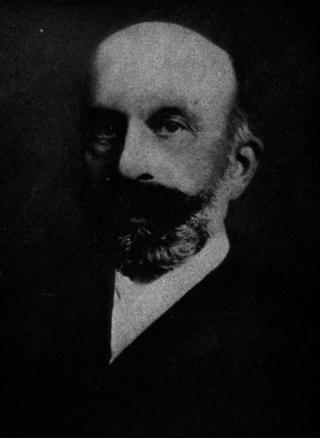
David Émile Durkheim, professionally known simply as Émile Durkheim, was a French sociologist. Durkheim formally established the academic discipline of sociology and is commonly cited as one of the principal architects of modern social science, along with both Karl Marx and Max Weber.

Ferdinand Tönnies was a German sociologist, economist, and philosopher. He was a significant contributor to sociological theory and field studies, best known for distinguishing between two types of social groups, Gemeinschaft and Gesellschaft. He co-founded the German Society for Sociology together with Max Weber and Georg Simmel and many other founders. He was president of the society from 1909 to 1933, after which he was ousted for having criticized the Nazis. Tönnies was regarded as the first proper German sociologist and published over 900 works, contributing to many areas of sociology and philosophy. Tönnies, Max Weber, and Georg Simmel are considered the founding fathers of classical German sociology. Though there has been a resurgence of interest in Weber and Simmel, Tönnies has not drawn as much attention.
Gemeinschaft and Gesellschaft, generally translated as "community and society", are categories which were used by the German sociologist Ferdinand Tönnies in order to categorize social relationships into two types. The Gesellschaft is associated with modern society and rational self-interest, which weakens the traditional bonds of family and local community that typify the Gemeinschaft. Max Weber, a founding figure in sociology, also wrote extensively about the relationship between Gemeinschaft and Gesellschaft. Weber wrote in direct response to Tönnies.

Albion Woodbury Small founded the first independent department of sociology in the United States at the University of Chicago in Chicago, Illinois, in 1892. He was influential in the establishment of sociology as a valid field of academic study.

In the social sciences, social structure is the aggregate of patterned social arrangements in society that are both emergent from and determinant of the actions of individuals. Likewise, society is believed to be grouped into structurally related groups or sets of roles, with different functions, meanings, or purposes. Examples of social structure include family, religion, law, economy, and class. It contrasts with "social system", which refers to the parent structure in which these various structures are embedded. Thus, social structures significantly influence larger systems, such as economic systems, legal systems, political systems, cultural systems, etc. Social structure can also be said to be the framework upon which a society is established. It determines the norms and patterns of relations between the various institutions of the society.

Florian Witold Znaniecki was a Polish and American philosopher and sociologist who taught and wrote in Poland and in the United States. Over the course of his work, he shifted his focus from philosophy to sociology. He remains a major figure in the history of Polish and American sociology; the founder of Polish academic sociology, and of an entire school of thought in sociology.

Sociology as a scholarly discipline emerged, primarily out of Enlightenment thought, as a positivist science of society shortly after the French Revolution. Its genesis owed to various key movements in the philosophy of science and the philosophy of knowledge, arising in reaction to such issues as modernity, capitalism, urbanization, rationalization, secularization, colonization and imperialism.
Humanistic sociology is a domain of sociology which originated mainly from the work of the University of Chicago Polish philosopher-turned-sociologist, Florian Znaniecki. It is a methodology which treats its objects of study and its students, that is, humans, as composites of values and systems of values. In certain contexts, the term is related to other sociological domains such as antipositivism. Humanistic sociology seeks to shed light on questions such as, "What is the relationship between a man of principle and a man of opportunism?"

Jerzy Ryszard Szacki was a Polish sociologist and historian of ideas. From 1973 he was a professor at the University of Warsaw, and in 1991 became a member of the Polish Academy of Sciences. He is considered one of the most prominent representatives of the Warsaw School of the History of Ideas.
The following events related to sociology occurred in the 1890s.
The following events related to sociology occurred in the 1900s (decade).
The following events related to sociology occurred in the 1920s.
The following events related to sociology occurred in the 1930s.
The following events related to sociology occurred in the 1940s.
The following events related to sociology occurred in the 1950s.
The following events related to sociology occurred in the 1960s.

Sociology in Poland has been developing, as has sociology throughout Europe, since the mid-19th century. Although, due to the Partitions of Poland, that country did not exist as an independent state in the 19th century or until the end of World War I, some Polish scholars published work clearly belonging to the field of sociology.

Sociology is the scientific study of human society that focuses on society, human social behavior, patterns of social relationships, social interaction, and aspects of culture associated with everyday life. Regarded as a part of both the social sciences and humanities, sociology uses various methods of empirical investigation and critical analysis to develop a body of knowledge about social order and social change. Sociological subject matter ranges from micro-level analyses of individual interaction and agency to macro-level analyses of social systems and social structure. Applied sociological research may be applied directly to social policy and welfare, whereas theoretical approaches may focus on the understanding of social processes and phenomenological method.
The International Institute of Sociology (IIS) is a scholarly organization which seeks to stimulate and facilitate the development, exchange, and application of scientific knowledge to questions of sociological relevance. Membership is open to all sociologists as well as to scholars in neighbouring disciplines.